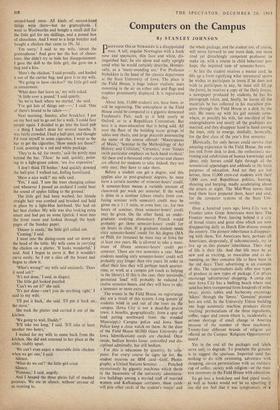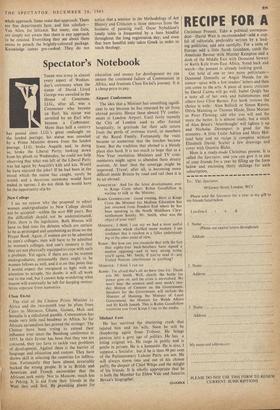Computers on the Campus
By STANLEY JOHNSON
pROFESSOR OSCAR NYBAKKEN is a disappointed man. A tall, angular Norwegian with a hook nose and spectacles, thin face and white,' dis- tinguished hair, he sits alone and sadly upright amid what he would certainly describe, Homeri- cally, as a 'many-sounding sea.' For Professor Nybakken is the head of the classics department at the State University of Iowa. The place is the Field House, a huge indoor stadium, seats mounting in the air on either side and flags and trophies prominently displayed. It is registration day.
About him, 11,000 students are, have been, or will be registering. The atmosphere in the Field House could be compared to a gigantic demented Freshman's Fair, such as is held yearly at Oxford, or to a Republican Convention. But here it is mass-education that is being sold. All over the floor of the building occur groups of tables and chairs, and large placards announcing the name of the course offered: 'Masterpieces of Music,' 'Seminar in the Methodology of Art History and Criticism,' Ceramics,' even 'Tennis (with particular emphasis on back-hand strokes).' All these and a thousand other courses and classes are offered for students to take. Indeed, they not only may; they have to take them.
Before a student can get 'a degree, and this applies also to post-graduate degrees, he must have, a certain number of semester-hours' credit. A semester-hour means a variable amount of class-work per week per semester. If the work is done in a seminar (chaos results from con- fusing seminar with semester) credit may be given on a 1 : 1 ratio, or.even less; i.e., for two hours of seminar, three semester-hours' credit may be given. On the other hand, an under- graduate studying elementary French would probably get three semester-hours' credit for six hours in class. If a graduate student needs sixty semester-hours' credit for his degree (MA or PhD, for instance) he must stay at Iowa for at least two years. He is allowed to take a maxi- mum of fifteen semester-hours' credit per semester. There are two semesters a year. Most students needing sixty semester-hours' credit will probably stay longer than two years. In order to offset their fees they will perhaps teach quarter- time, or work at a campus job ,(such as helping in the library). If this is the case, their maximum permitted 'load' will probably be reduced to twelve semester-hours, and they will have to stay a' semester or more extra.
The events in the Field Hotie on registration day are a result of this system. Long 'queues of students wind in and out of ;the trees on the campus. (Iowa 'City is not a dead-flat prairie' town; it benefits, geographically, from a spur of land jutting northward from the wooded Mississippi.) Campus police and Iowa State Police keep a close watch on them. At the door of the Field House SUDD (State University of Iowa Identification) cards are checked. Once inside, bedlam breaks loose; controlled' and dis- ciplined admittedly, but still bedlam.
For this is education by quantity, by com- puter. For every course he signs up for, the student receives an. IBM card—Golf, Photo- graphy, a United Nations Seminar. . . . Punched mysteriously by gigantic machines which throb in the basements of the university administra- tive buildings among a myriad staff of married women and Kafkaesque corridors, these cards will join other cards of the student's 'major' and the whole package, and the student too, of course, will move forward to one more desk, one more tired yet disturbingly competent professor, to make up, with a course in child behaviour per- haps, the, required sum of semester-hours.
At last the student receives a master card, he fills up a form signifying what intramural sports he wishes to participate in (even if he does, not wish to participate in any, he must, still fill alp the form), he receives a copy of the Daily Iowan, a newspaper produced by students, he has his' photograph taken, and, finally, he leaves all the materials he has collected in his marathon pro- gress through the Field House at a desk by the exit. He meets up with his girl outside some- where, or possibly his wife, for one-third of the undergraduates and nearly all the graduates are married, and they disappear hand in hand among the trees, only to emerge, dutifully, heroically, for the first class of the year's first semester.
Heroically, for only heroes could survive that amazing experience in the Field House, the end- less trek from desk to desk, the enthusiastic sec- tioning and subdivision of human knowledge and ideas; only heroes could fight through all the nonsensical appendages and addenda to the basic purposes of education. And yet they are not heroes, these 11,000 crew-cut students with their 7,000 cars and Republican politics, hooting, shouting and burping, madly accelerating about the streets at night. The Mid-West towns that bred them have prepared them, heart and soul, for the computer systems of the State Uni- versity.
Over a hundred years ago, Iowa City was a Frontier town, Great Americans were here. The Frontier moved West, leaving behind it a city of broad streets and great elms which are now disappearing daily as Dutch Elm disease sweeps the country. The pioneer inheritance is disappear- ing with them. Yet Americans here, perhaps all Americans, desperately, if subconsciously, try to live up to this pioneer inheritance. Their way of life is their life. And that life must be as new and as exciting, as masculine and as de- manding,as they conceive life to have been in the old days.. 'Their advertising is an example of this. The supermarkets daily offer new types of produce in new types of package. Cut prices encourage 'adventurous' shopping. A camp site nea'r Iowa City has a bathing beach where real sand has been transported from hundreds of miles away; picnic tables and barbecues encourage 'hikers' through the `forest.' Genuine' pioneer hats are sold. In the University Union building one huge automatic machine produces eleven 'exciting' permutations of the three ingredients, coffee, sugar and cream (there is, incidentally, a serious shortage of small change in America because of the number of these machines), 'Twenty-four different brands of religion are offered on the Campus 'Religious Opportunities' board.
Yet in the end all the packages and labels serve only to degrade. To proclaim the genuine is to suggest the spurious. Imported sand has nothing to do with swimming, adventure with shopping, eleven permutations with an ordinary cup of coffee, variety with religion—or the mas- sive ceremony do the Field Hodse with education.
To go into a bookshop and find piped music as well as books would not be so upsetting if one did not feel that it was symptomatic of a whole approach. Some resist that approach. There are fine departments here, and fine scholars— Van Allen, for instance. But many, one feels, are simply not aware that there is any approach to be resisted. Everything they see about them seems to preach the brightly-coloured package. Knowledge comes pre-cooked. They do not
notice that a seminar in the Methodology of Art History and Criticism is three removes from the business of painting itself. Oscar Nybakken's lonely table is frequented by a bare handful throughout the long registration day; and even that bare handful only takes Greek in order to teach theology.































 Previous page
Previous page